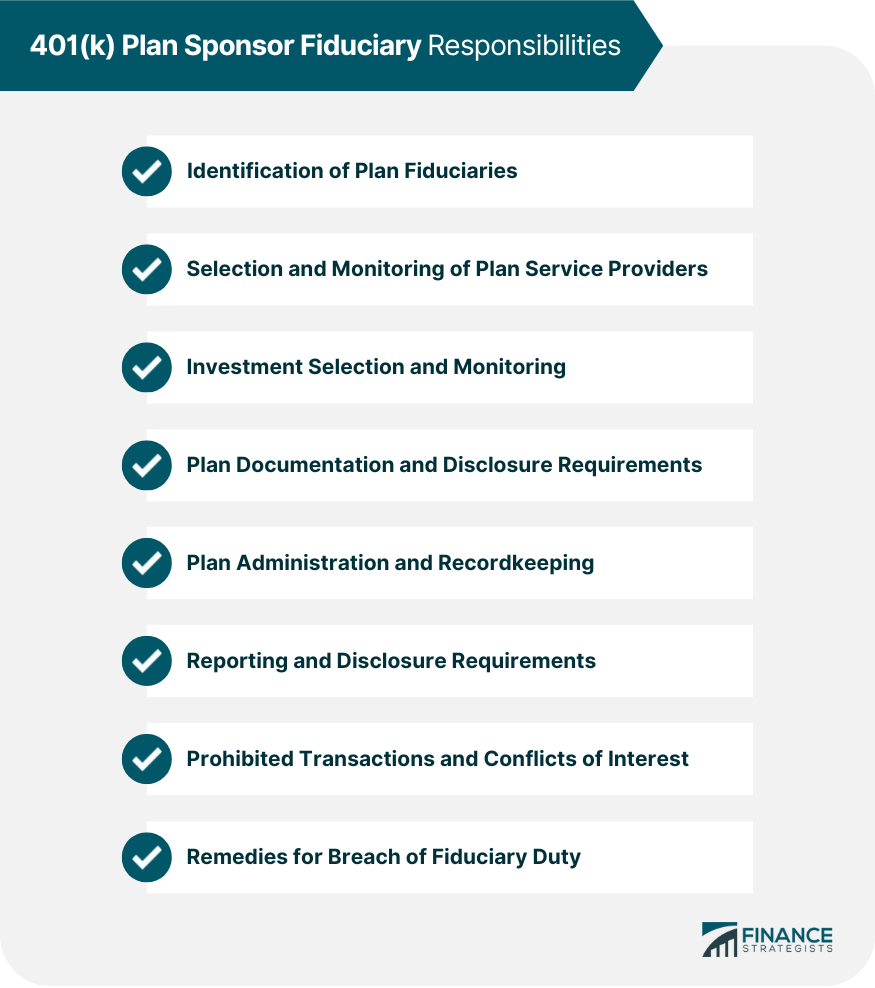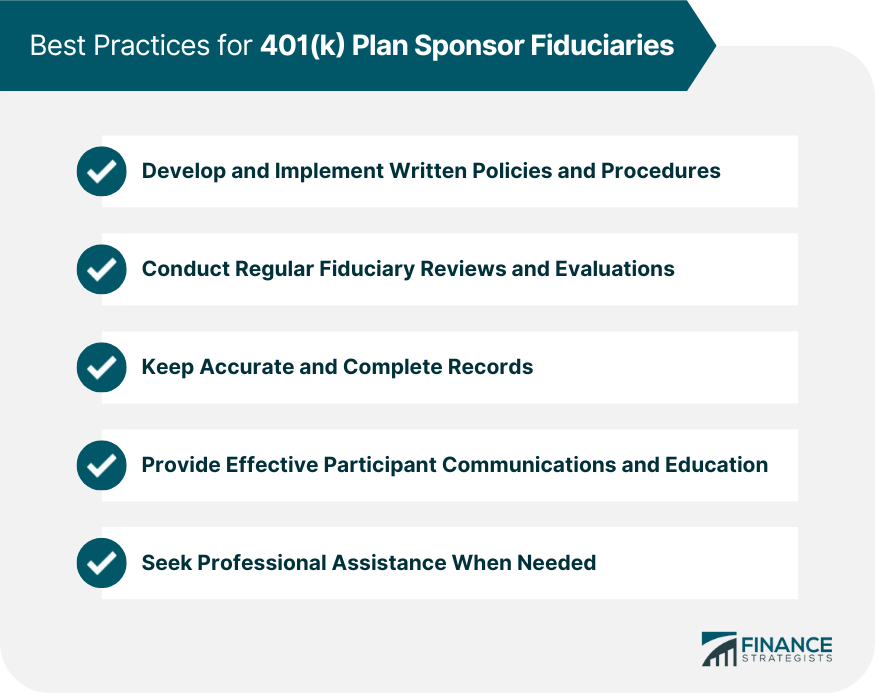Fiduciary responsibilities refer to the legal obligations of plan sponsors and other fiduciaries to act in the best interest of plan participants and their beneficiaries. These responsibilities include prudence, loyalty, diversification, compliance, and monitoring. Have questions about 401(k) Plans? Click here. Understanding and meeting the responsibilities of a 401(k) plan fiduciary is crucial for managing a 401(k) plan and protecting the interests of plan participants. Plan sponsors must identify all plan fiduciaries, including named and functional fiduciaries, and ensure they understand their responsibilities. Plan sponsors must carefully select and monitor plan service providers, including investment advisors, recordkeepers, and custodians. This includes conducting due diligence on potential service providers, regularly reviewing their performance, and ensuring they are meeting the plan's needs and objectives. Plan sponsors must prudently select and monitor investment options offered in the plan, including considering fees and expenses, performance, and risk. This includes regularly reviewing and benchmarking investment options to ensure they continue to meet the plan's needs and objectives. Plan sponsors must ensure the plan's documents and disclosures comply with all applicable laws and regulations, including ERISA and Internal Revenue Code requirements. This includes providing participants with required disclosures, such as the Summary Plan Description, and ensuring the plan is properly documented. Plan sponsors must ensure the plan is properly administered and that accurate and complete records are maintained. This includes ensuring contributions are timely deposited, distributions are properly processed, and accurate participant records are maintained. Plan sponsors must comply with reporting and disclosure requirements, including filing annual Form 5500 reports and providing participants with required notices and disclosures. Plan sponsors must avoid prohibited transactions and conflicts of interest, including self-dealing and transactions with parties in interest. This includes ensuring transactions are properly documented and avoiding transactions that could result in personal gain or other conflicts of interest. Plan sponsors may be held liable for breaches of fiduciary duty, including losses to the plan resulting from imprudent investments or other actions. Remedies for breach of fiduciary duty may include restoring losses to the plan, paying legal fees and other costs, and being removed as a plan fiduciary. Best Practices for 401(k) Plan Sponsor Fiduciaries are a set of guidelines aimed at ensuring compliance with fiduciary responsibilities and promoting effective management of 401(k) plans. Plan sponsors should develop and implement written policies and procedures for managing the 401(k) plan, including policies for selecting and monitoring service providers, investment selection and monitoring, and compliance with legal and regulatory requirements. Plan sponsors should conduct regular reviews and evaluations of the plan's fiduciaries, service providers, and investment options. This includes conducting due diligence on potential service providers, regularly reviewing investment performance and fees, and monitoring compliance with legal and regulatory requirements. Plan sponsors should maintain accurate and complete records of the plan's operations, including contributions, distributions, and investment performance. This includes ensuring participant records are up-to-date and accurate and maintaining proper documentation of all plan transactions. Plan sponsors should provide effective participant communications and education, including regular plan updates, educational materials, and investment education. This can help ensure participants understand their rights and responsibilities and make informed decisions about their retirement savings. Plan sponsors should seek professional assistance when needed, including legal, accounting, and investment advice. This can help ensure the plan is properly managed and compliant with legal and regulatory requirements. 401(k) plan sponsor fiduciary responsibilities are crucial for ensuring compliance with legal and regulatory requirements, protecting the interests of plan participants and their beneficiaries, and making informed decisions about plan management. These responsibilities include selecting and monitoring service providers, investment selection and monitoring, compliance with legal and regulatory requirements, and avoiding prohibited transactions and conflicts of interest. Compliance with fiduciary responsibilities can help participants achieve their retirement savings goals and contribute to their financial security in retirement.What Are Fiduciary Responsibilities?
401(k) Plan Sponsor Fiduciary Responsibilities

Identification of Plan Fiduciaries
Selection and Monitoring of Plan Service Providers
Investment Selection and Monitoring
Plan Documentation and Disclosure Requirements
Plan Administration and Recordkeeping
Reporting and Disclosure Requirements
Prohibited Transactions and Conflicts of Interest
Remedies for Breach of Fiduciary Duty
Best Practices for 401(k) Plan Sponsor Fiduciaries

Develop and Implement Written Policies and Procedures
Conduct Regular Fiduciary Reviews and Evaluations
Keep Accurate and Complete Records
Provide Effective Participant Communications and Education
Seek Professional Assistance When Needed
Conclusion
401(k) Plan Sponsor Fiduciary Responsibilities FAQs
Yes, plan sponsors may be held liable for losses to the plan resulting from imprudent investments or other breaches of fiduciary duty. This can include restoring losses to the plan, paying legal fees and other costs, and being removed as a plan fiduciary.
Fiduciary responsibilities refer to the legal obligations of plan sponsors and other fiduciaries to act in the best interest of plan participants and their beneficiaries. These responsibilities include prudence, loyalty, diversification, compliance, and monitoring.
Prohibited transactions in a 401(k) plan include transactions between the plan and a disqualified person, self-dealing by plan fiduciaries, and transactions that result in the plan providing a benefit to a party in interest. These transactions can result in significant legal and financial consequences for the plan sponsor and other fiduciaries.
Best practices for plan sponsors to meet their fiduciary responsibilities include developing and implementing written policies and procedures, conducting regular reviews and evaluations, keeping accurate and complete records, providing effective participant communications and education, and seeking professional assistance when needed.
Non-compliance with fiduciary responsibilities can result in significant legal and financial consequences, including legal penalties, financial penalties, and reputational damage. It can also result in losses to plan participants and their beneficiaries, and potentially impact their retirement savings goals.
True Tamplin is a published author, public speaker, CEO of UpDigital, and founder of Finance Strategists.
True is a Certified Educator in Personal Finance (CEPF®), author of The Handy Financial Ratios Guide, a member of the Society for Advancing Business Editing and Writing, contributes to his financial education site, Finance Strategists, and has spoken to various financial communities such as the CFA Institute, as well as university students like his Alma mater, Biola University, where he received a bachelor of science in business and data analytics.
To learn more about True, visit his personal website or view his author profiles on Amazon, Nasdaq and Forbes.











